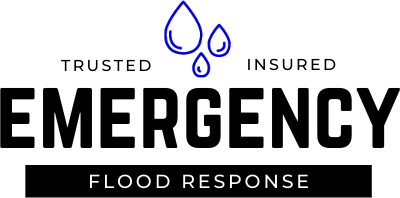Flooding and water damage clean-ups are complex, extensive tasks. It’s why you must work with a professional restoration company that specializes in water damage, flooding, and mold. They carry the proper licensing, coverage, and necessary permits for legally required inspection and construction. They also understand the causes, issues that come from water damage and provide time-tested solutions.
Insurance can be tricky. Hiring professionals can help you make sure you understand the terms of your policy correctly and choose the proper service to meet your coverage. Emergency Flood Response will bill your insurance provider directly, so you don’t have to worry!
Mold growth is a common consequence of flooding – never assume you won’t face it. If a building gets flooded, water seeps into the sub-levels and porous materials and stays there, even if the building appears dry. The excessive moisture creates the perfect environment for mold to grow, including dangerous forms such as Stachybotrys Chartarum or toxic black mold.
Call us right away! When it comes to preventing as much water damage as possible, time is crucial. At first glance, any flooding may appear hopeless, but you have to work quickly to ensure that the damage stays contained and doesn’t become worse. Bringing in a professional restoration company means you have access to the knowledge, skills, equipment, and other essential resources they use to handle the clean-up and restoration. They also know how to find more problems before they lead to future floods and excess water incidents.
Water damage is not just harmful to your home or business – it can have long-term consequences on the health of you, your family and your customers or clients. Flooding and excess water are associated with mold, whose spores can cause health problems and exacerbate existing ones. Water damage and moisture also increase the risk of infections and diseases, and it can increase the likelihood of issues like conjunctivitis, dermatitis, and nose, ear, and throat infections.
Standing water can also act as a breeding ground for insects like mosquitoes, increasing the risk of vector-borne diseases (and annoying bug bites).
The Institute of International Cleaning and Restoration Certification (IICRC) states three types of water damage:
Category 1 – Clean Water
Clean water is floodwater that does not represent a health risk. Broken equipment and appliances, toilet holding tanks, and rainwater can all cause it. Even standing clean water can become contaminated in as little as 48 hours, even if the water is not immediately dangerous.
Category 2 – Greywater
Greywater is waste water that hasn’t been contaminated by feces. Showers, bathtubs, dishwashers, washing machines, and sinks all contribute to this total. Greywater can make you sick if you eat it since it contains minor amounts of pollutants. A damaged pipe, an overflowing appliance, or a faulty plumbing fixture can all lead to greywater flooding. When greywater flooding occurs, it is best to employ professionals to carefully clean the area.
Category 3 – Blackwater
Blackwater is contaminated wastewater that contains poisons and human waste. It’s caused by burst sewage lines. Blackwater floods are the most dangerous and devastating, which is why it’s best to call in a water restoration professional to analyze the issue.
- Call or contact Emergency Flood Response immediately. A professional can come check out your water damage emergency at any time. We provide restoration services 24/7.
- Turn off all electrical devices and electricity near the water damage. Try to contain the damage by blocking it off from reaching other areas. Use safety equipment if you need to get close. Looks for signs of structural damage and watch for hidden debris. Securing the property and damaged area is very important so it doesn’t damage more areas in your home.
- After taking precautions. Inspect the damaged areas and wait for a professional to arrive.
